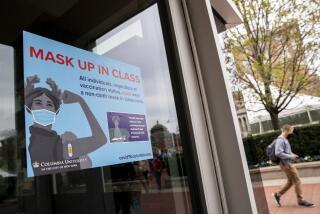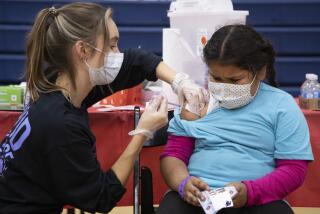College Students Advised to Get Meningitis Shots
- Share via
Concerned about increasing outbreaks of bacterial meningitis on college campuses, health officials are encouraging students--particularly incoming freshmen--to get vaccinated against the rare but potentially fatal infection.
USC, Loyola Marymount and Caltech inoculated more than 1,000 students in recent weeks, sending letters to students and parents explaining that the close contact of dorm living increases the risk.
“I thought it was stupid not to do it,” said Mark Rudner, a freshman who rolled up his sleeve at Caltech. “You can die if you get meningitis.”
These universities plan to join hundreds of other colleges across the country in a major vaccine drive in the fall.
Although outbreaks are rare and sporadic, the seriousness of the disease was underscored this spring when a student at USC, another at UC Irvine and a third at Loyola Marymount University came down with the disease. All were treated at hospitals; one of the students died from the illness.
Desiree Benson, a USC junior, did not initially seek treatment for the flu-like symptoms, said Dr. Lawrence Neinstein, director of USC’s Student Health Center. A roommate at her off-campus apartment called paramedics after Benson was found in a coma. She died in the hospital March 23.
Neinstein noted that it was the first case of meningitis on the USC campus in at least four years. Students who came in close contact with Benson were treated with antibiotics as a precaution.
“People really panic with meningitis,” Neinstein said. “We were trying to un-panic students. There is no epidemic in L.A. or on any college campus.”
Bacterial meningitis strikes about 3,000 Americans each year, resulting in about 300 deaths. The American College Health Assn. estimates that about 100 to 125 cases occur on college campuses each year, and five to 15 students die as a result.
*
Los Angeles County public health officials recorded 29 cases of bacterial meningitis--including three deaths--during the first four months of this year. None of the cases were linked. By comparison, 24 cases were recorded during the corresponding period last year.
Studies have shown the culprit, a microbe called Neisseria meningitidis, is prevalent in the throats of college students, particularly freshmen who live in dorms or other group living arrangements.
It can be spread by coughing or sneezing in someone’s face, but much more likely through sharing a drink, a cigarette or a spoon, or by kissing.
Only a tiny fraction of these students develops the disease. It’s often unclear why. But experts believe that students are more prone to get the disease if they have compromised immune systems or respiratory infections. They say students may increase their risk of the disease by smoking and excessive drinking.
Outbreaks usually occur in late winter or early spring. The disease begins like the flu, often with a sore throat, headache, fever, stiff neck and rash. But it can progress to a lethal stage in as few as 12 hours, attacking the membrane and fluid encasing the brain and spinal cord.
About 10% to 13% of patients die, despite antibiotic treatment. Another 10% have severe aftereffects, which include mental retardation, hearing loss and loss of use of limbs.
Although the chance of getting the disease is remote, freshmen living in dormitories have a risk of contracting meningitis that’s six times higher than college students overall, according to the U.S. Centers for Disease Control and Prevention. And the number of outbreaks of the disease have been growing nationwide, with some of those occurring on college campuses, said the college health association.
A CDC advisory panel now recommends that college students and their parents be informed about the disease and the benefits of vaccination. It also recommended that the vaccine be made available to students.
At USC, about 950 students lined up recently in the campus gym to get the vaccine, which the school offered at $75 per student. Loyola Marymount and Caltech also had strong turnouts of students who wanted the vaccine that enhances immunity to four strains of the bacterium responsible for 70% of the cases.
“My parents were saying, you better get it,” said Vi Ngo, a Caltech freshman from Redondo Beach. “My parents are going to make my little sister get it too before she goes to college.”
*
The vaccine was developed by the U.S. military. Since the early ‘70s, it has been administered to all recruits and effectively eliminated 90% of cases among soldiers who also live in close quarters--barracks.
The vaccine remains effective for three to five years. Adverse reactions are mild and infrequent, consisting primarily of redness and pain at the site of injection lasting up to two days. Experts say a booster shouldn’t be needed because people tend to build natural immunity as they move into their mid-20s.
The Maryland Legislature in April mandated that all college freshmen get the vaccine. Gursh Bindra, of Vaccess Health, said as many as a dozen colleges in Southern California are in the process of signing up his firm to offer mass vaccinations in the fall.
“Some places have been slow to wake up to the disease,” he said. “Unfortunately, it takes a case or two before people wake up.”
More information on the meningococcal vaccine can be obtained by calling the Centers for Disease Control and Prevention at (800) 232-2522 or (800) 232-7468, or by checking the agency’s Web site at https://www.cdc.gov. Or you can contact the American College Health Assn. at (410) 859-1500 or at https://www.acha.org.
The Symptoms
Bacterial meningitis is often mistaken for the flu. Early symptoms include fever, severe headache, stiff neck, nausea, vomiting, lethargy, and a rash appearing as tiny red or purple-black spots, or larger spots resembling bruises in areas such as armpits, groin or ankles. The American College Health Assn. urges students to seek medical care immediately if they experience two or more of these symptoms.
More to Read
Sign up for Essential California
The most important California stories and recommendations in your inbox every morning.
You may occasionally receive promotional content from the Los Angeles Times.













